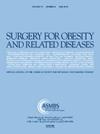选择性血清素再摄取抑制剂对垂直袖状胃切除术后体重减轻的影响
IF 3.5
3区 医学
Q1 SURGERY
引用次数: 0
摘要
抑郁症等精神疾病在减肥人群中十分常见,抗抑郁药是最常用的处方药之一。我们的手术旨在研究选择性血清素再摄取抑制剂(SSRI)对垂直袖带胃切除术(VSG)患者减肥的影响。美国大学附属社区医院。我们在一家减肥中心对 2011 年至 2018 年期间接受垂直袖带胃切除术的成人(年龄大于 18 岁)进行了回顾性病历审查,多名减肥外科医生参与了审查。这些患者共接受了 2 年的随访。排除标准包括在 2 年随访期间接受过翻修手术、在指数手术后或术后 2 年内开始服用 SSRI,以及错过 3 次或 3 次以上术后就诊的患者。共有267名患者符合标准,并被分为两组:手术前服用SSRI的患者和未服用SSRI的患者。统计分析采用T检验和卡方检验,显著性设定为< .05。SSRI组的术前体重平均为118.57千克(±20.59),而非SSRI组的术前体重平均为129.60千克(±24.39)(< .0001)。同样,SSRI 组术前体重指数(BMI)平均为 43.34(±6.14),而非 SSRI 组平均为 46.13(±6.82)(= .001)。在 1 个月、3 个月和 6 个月的随访中,SSRI 组的平均体重指数和体重均低于非 SSRI 组。但在 1 年和 2 年的随访中,体重和体重指数不再有统计学差异。两组之间的总重量变化百分比(%TWC)没有明显差异;SSRI 组的总重量变化百分比为 22.17,非 SSRI 组为 23.35 ( = .324)。在随后的每个间隔期,随访出席率都明显下降,在 2 年的随访中,SSRI 组为 65.41%,非 SSRI 组为 29.27%。根据我们的分析,我们认为 VSG 是服用 SSRIs 患者减肥的有效选择。然而,由于本研究的局限性,尤其是随访方面的局限性,我们还需要进一步的研究来支持这一结论。本文章由计算机程序翻译,如有差异,请以英文原文为准。
Impact of selective serotonin reuptake inhibitors on weight loss after vertical sleeve gastrectomy
Background
Mental health disorders, such as depression, are prominent within the bariatric population, with antidepressants ranking among the most frequently prescribed medications.
Objectives
Our surgery aimed to investigate selective serotonin reuptake inhibitor (SSRI) effects on weight loss in patients undergoing vertical sleeve gastrectomy (VSG).
Setting
University affiliated Community Hospital, United States.
Methods
We performed a retrospective chart review at a single bariatric center, involving multiple bariatric surgeons, on adults (>18 years of age) who underwent VSG between 2011 and 2018. The patients were followed for a total of 2 years. Exclusion criteria included revisional surgery during the 2-year follow-up period, SSRI prescription initiated after the index surgery or within 2 years following surgery, and individuals who missed 3 or more postoperative visits. A total of 267 patients met the criteria and were categorized into 2 groups: those prescribed an SSRI prior to surgery and those not on an SSRI. Statistical analysis was performed using T-tests and chi-square tests, with significance set at P < .05.
Results
The preoperative weight in the SSRI group averaged 118.57 kg (±20.59), whereas in the non-SSRI group, it averaged 129.60 kg (±24.39) (P < .0001). Similarly, the preoperative body mass index (BMI) in the SSRI group averaged 43.34 (±6.14), while in the non-SSRI group, it averaged 46.13 (±6.82) (P = .001). At the 1-month, 3-month, and 6-month follow-ups, the average BMI and weight were lower in the SSRI group compared to the non-SSRI group. However, at the 1-year and 2-year follow-ups, the weight and BMI were no longer statistically different. There was no significant difference in the percentage total weight change (%TWC) between the groups; the %TWC was 22.17 in the SSRI group and 23.35 in the non-SSRI group (P = .324). Follow-up attendance significantly decreased at each subsequent interval, with 65.41% in the SSRI group and 29.27% in the non-SSRI group at the 2-year follow-up.
Conclusions
Based on our analysis, we suggest that VSG can be an effective option for weight loss in patients taking SSRIs. However, due to the limitations, particularly with follow-up of this study, further research is needed to support this conclusion.
求助全文
通过发布文献求助,成功后即可免费获取论文全文。
去求助
来源期刊
CiteScore
6.70
自引率
12.90%
发文量
570
审稿时长
56 days
期刊介绍:
Surgery for Obesity and Related Diseases (SOARD), The Official Journal of the American Society for Metabolic and Bariatric Surgery (ASMBS) and the Brazilian Society for Bariatric Surgery, is an international journal devoted to the publication of peer-reviewed manuscripts of the highest quality with objective data regarding techniques for the treatment of severe obesity. Articles document the effects of surgically induced weight loss on obesity physiological, psychiatric and social co-morbidities.

 求助内容:
求助内容: 应助结果提醒方式:
应助结果提醒方式:


